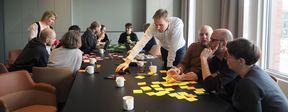10 superpowers for the future of work

Are generic skills the core skills of the future?
The profound changes in work also challenge education. As Charles Fadel, the Founder and Chairman of the Center for Curriculum Redesign has put it:
“Education much needs an innovative curriculum adapted to the needs of 21st century learners and societies: Is education relevant enough for this century? Are we educating learners to be versatile in a world that is increasingly challenging?”
Many experts suggest that we should re-think the core-skills of the (academic) education: Should we keep educating deep substance experts? Or should we focus more on the generic, transferable, transversal or so-called soft-skills we all need in the work-life despite our specific field of knowledge or the organization in which we work?
Work = Learning
The idea that education should focus more and more on general skills is based on the fact that the field-specific knowledge changes and updates so quickly that we must anyway be able to learn and re-skill ourselves throughout our careers. And, for most of us changing the whole career a few times in our lives will be just normal.
It has been said that in the future the work is learning. That makes the ability to engage effectively in lifelong learning one of the most crucial 21st-century capabilities:
"The broad change that will be required in this new world of learning and work is to move away from traditional, front-loaded accreditation and siloed certificates to a system of lifelong learning infused with a shared set of skills-based indicators at its core.” (World Economic Forum, 2019)
Charles Fadel, the Founder and Chairman of the Center for Curriculum RedesignIs education relevant enough for this century?
Empathy as a trending characteristic
Mah and Ifenthaler (2017) have defined that the academic competence for successful degree completion includes:
- time management
- learning skills
- self-monitoring
- technology proficiency and
- research skills.
Many surveys also suggest that the rising work-life competences also include abilities like complex problem-solving, critical thinking, creativity, adaptability, communication, and collaboration.
Also, empathy and emotional intelligence have been identified as trending skills, maybe because those are genuinely human characteristics differentiating our abilities from the work that robots or AI can also conduct. In the future, the ability to genuinely care, love and empathize with each other can be the winning attribute in the job market.
Future superpowers
We are now in the process of internally defining what could be the most critical superpowers of Aalto graduates for the future of work. I will share with you ten great and a bit different ideas on what we should equip ourselves with in the future.
- Courage
to live our own lives and keep reaching for our dreams and goals - Curiousness
towards challenges, other people and cultures and the whole world around us - Taking care
of our well-being as well as others' - Ethical behavior
in everything we do - Situational sensitivity
understanding and appreciating the uniqueness of each problem, situation and person - Storytelling
since we are not selling products or even services anymore, but experiences - Self-awareness
to be able to be me - Change agency
understanding of what wall I can move and how and be willing actually to move it - Resilience to stress
understanding the positive and temporary stress and being able to cope with the harmful one - Dream-Drive-Deliver -attitude
no explanations needed.
The first Focus Group Discussion held in February 2019 was aiming to identify what are the critical work-life competences of Aalto graduate. The ideas shared in this discussion inspired me to write this article.






